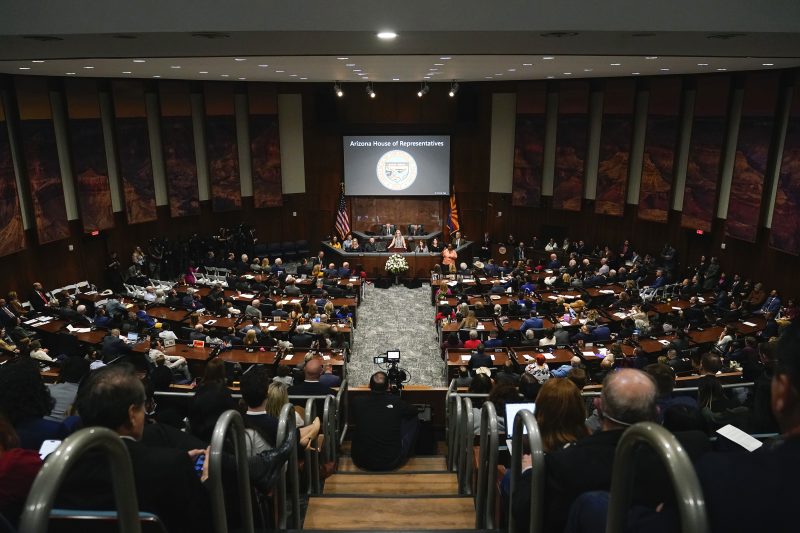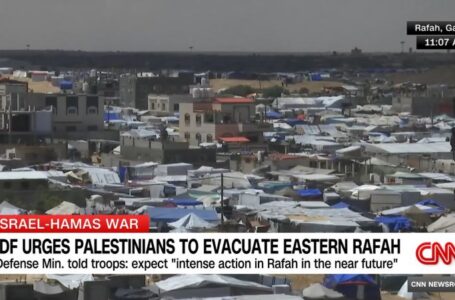‘I am leaving for the unknown.’ Palestinians fleeing Rafah describe their fear and despair
To avoid election crisis, Arizona lawmakers try bipartisanship


PHOENIX — Alarmed that Arizona’s 11 electoral votes might not be counted in the process for selecting the next American president, Republicans and Democrats in this political battleground did something rare: They found consensus.
After months of warnings and a frantic series of negotiations, the narrowly divided legislature passed a bill Thursday aimed at giving election officials more time to run the 2024 primary and general elections. The last-minute fix eased anxieties for election officials who for months had implored Arizona Gov. Katie Hobbs (D) and lawmakers from both sides of the aisle to make changes to the election calendar to allow them more time to do their jobs while meeting mandated deadlines — or risk national embarrassment and an electoral crisis.
Finally, the pressure of a Friday deadline brought together an unlikely alliance in a state where election skepticism took root after Donald Trump’s 2020 loss and still flourishes. A supermajority of lawmakers from all factions — from MAGA Republicans to progressive Democrats — came together to pass the legislation.
Hobbs said in an interview she will sign the bill Friday. It will go into effect immediately.
On the opposite end of the political spectrum, state Sen. Wendy Rogers (R), who chairs her chamber’s elections committee and has refused to accept Republican losses in the 2020 and 2022 elections, embraced the legislation. She said it was an important step “in restoring voter confidence” in the integrity of the state’s elections. The bill, she said in a statement, “will enable us to accurately determine the winner sooner rather than later.”
In 2020, the presidential election in Arizona was decided by 10,457 votes out of nearly 3.4 million cast, unleashing years of false claims and attacks on the management of elections. Lawmakers responded by passing a bipartisan bill that lowered the threshold that triggers automatic recounts in statewide and legislative races. They said at the time it would build confidence in electoral outcomes, even though county elections officials said that the work would be burdensome and that voters could already trust outcomes.
“The fact that we’re in this situation is a continued symptom of the conspiracies from the 2020 election,” Hobbs said in an interview.
Election officials warned that the new law would make it difficult for election workers to finish re-tallying ballots in close primary contests while also meeting deadlines for mailing general election ballots to voters overseas or in the military. The deal expands the amount of time between the two by moving up the primary date for most races to July 30 from Aug. 6. (The presidential preference election will still be held on March 19.)
With the state poised to play a major role in deciding the 2024 presidential race, officials had also expected that the expanded recounts would force them to miss key deadlines that are part of the electoral college process. The new deal buys officials more time by allowing them to electronically transmit results instead of having to drive paperwork to downtown Phoenix and by changing the window of time during which voters are allowed to make changes to their ballots.
The legislation changes the window from five business days to five calendar days, giving voters more flexibility to resolve issues with their ballots during the weekends immediately before and after the election — not just workdays. That process, known as “curing,” typically involves questions about voter signatures or identification. Counties will continue to contact voters to let them know their ballots need to be fixed so that they can be counted. Under the new law, counties will also send the names of voters whose ballots need to be cured to all state-recognized parties, which can also contact voters in a process known as “ballot-chasing.”
Jack Sellers (R), chair of the governing board of Maricopa County, home to Phoenix and most of the state’s voters, said that the changes will have little impact on voters’ experience, echoing a sentiment expressed by election workers and lawmakers.
Jen Marson, executive director of the Arizona Association of Counties, which lobbies for counties, said she was “grateful” that state leaders overcame partisan differences to make sure Americans overseas could vote, “and to ensure that Arizona has a voice in the presidential race.”











